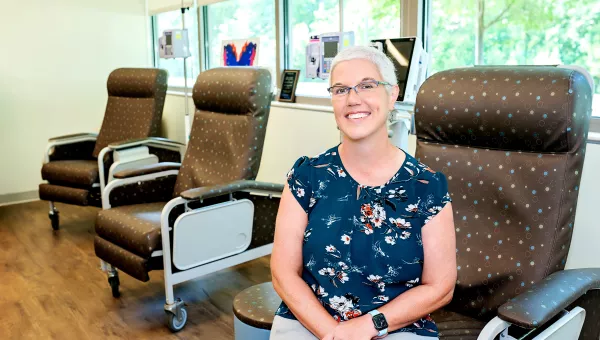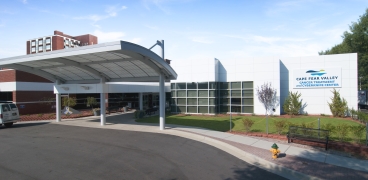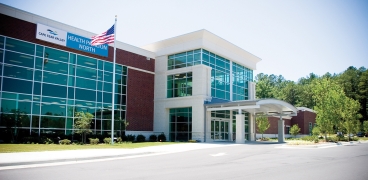The Cape Fear Valley Health cancer team provides the highest level of personalized chemotherapy treatment. And we offer it at a number of convenient locations in Bladen, Cumberland, Harnett and Hoke Counties.
What Is Chemotherapy?
Chemotherapy, or chemo, is cancer treatment that uses medication to target and kill cancer cells.
Chemotherapy is often the first choice for treating cancer because it’s both effective and predictable. It can be used on its own or in combination with other treatments like surgery and radiation therapy.
Personalized chemotherapy plan
Cape Fear Valley Health medical oncology experts will work with you to make a personalized chemotherapy treatment plan. They consider your goals and needs along with the most effective drugs for your specific diagnosis.
Advances in chemotherapy are happening constantly, so our team draws on the latest research when making your plan. We give you access to the most effective treatment, including clinical trials of new drugs, close to home.
Our Approach to Chemotherapy
At Cape Fear Valley Health, your care and comfort always come first during cancer treatment.
We offer the same state-of-the-art chemotherapy you can get at larger cancer centers, with a more personal approach. Even if you have cancer surgery elsewhere, you can continue your treatment with chemotherapy here.
Planning your treatment
Your oncologist uses a high-tech digital tool to make a detailed, 3D map of your cancer. This helps them personalize your chemotherapy drugs and treatment schedule.
- You may need chemotherapy to:
- Shrink tumors before you have surgery or radiation therapy
- Destroy cancer cells that remain after surgery or radiation
- Help other treatments work more effectively
- Kill cancer cells that have spread to other parts of your body
Your chemotherapy team
You’ll have a team of experts alongside you from start to finish on your chemotherapy journey. They include:
- Medical oncologists
- Chemotherapy nurses
- Pharmacists
- Social workers
- Dietitians
- Physical therapists
If you’re also having surgery or radiation therapy, your team works closely with those providers to coordinate your treatment.
What to Expect With Chemotherapy
Most chemotherapy drugs are given in cycles. You get one or more doses over a period of time, then get a break before starting the next cycle. This helps you rest and recover from any side effects.
For your convenience, you can choose to have chemotherapy at the Cape Fear Valley Health location that’s closest to you.
If you’d like to join others who are getting chemotherapy infusions, we have comfortable recliners grouped together. If you prefer privacy, we have private treatment stations. And our facilities are set up for easy wheelchair access if you need it.
Ways to get chemotherapy
Chemotherapy drugs are administered in a variety of ways. The most common methods include the following.
- Intravenous (IV): An infusion into a vein. You may have a catheter or port implanted under your skin to make infusion easier and more comfortable.
- Oral: Pills or liquids that you swallow
- Injection: A shot into a muscle, fatty tissue or spinal fluid
- Intraperitoneal: An infusion into the abdomen
- Intra-arterial: An infusion directly into the artery leading to the cancer
- Topical: A cream you rub on your skin
Chemotherapy drugs
Chemotherapy drugs are often used in combination for maximum effectiveness. Some of the most common types include the following:
- Alkylating agents keep cancer cells from reproducing. They’re most often used for breast cancer, lung cancer, ovarian cancer, and certain types of brain cancer. Examples: cisplatin, cyclophosphamide, melphalan
- Anthracyclines change cancer cells’ DNA so they stop growing and multiplying. They treat a wide range of cancers, including ovarian cancer and breast cancer. Examples: doxorubicin, daunorubicin
- Antimetabolites starve cancer cells to stop them from making copies of themselves. They treat leukemia, breast cancer, ovarian cancer, gastrointestinal cancers and others. Examples: methotrexate, capecitabine
- Mitotic inhibitors stop cancer cells from dividing. They’re used to treat breast cancer and lung cancer. Examples: paclitaxel, docetaxel, vinblastine, vincristine
- Topoisomerase inhibitors interfere with enzymes that let cancer cells multiply. They can treat lung cancer, ovarian cancer, gastrointestinal cancers, colorectal cancer and pancreatic cancer. Examples: irinotecan, etoposide, mitoxantrone
Managing chemotherapy side effects
Because chemotherapy drugs have to be strong to kill cancer cells, they can also cause side effects.
Not everyone experiences side effects, but some of the most common side effects of chemotherapy are
- Fatigue
- Nausea and vomiting
- Constipation or diarrhea
- Hair loss
- Mouth sores
- Decreased blood cell counts
Your cancer care team will monitor you closely to prevent and manage side effects. Medications can help with nausea, constipation, diarrhea and other issues.
We can also connect you with our cancer support team, which offers massage and reflexology to ease chemotherapy side effects.









